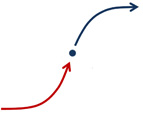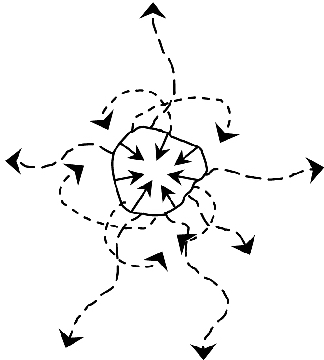There are a great variety of reasons to organize people
Sometimes it’s to discover something or to accomplish something Sometimes it’s to connect people who share their viewsSometimes for people who share a common world from different views…
(but have remarkably different talents and views)
If you know of good examples or methods not mentioned here,
please post comments
It’s Collaborative Work between groups of stakeholders that often “don’t speak the same language”. It takes art, patience and a sound method to get them to immerse themselves in the environment of the problem or opportunity that they need each other to respond to as partners.
They find there’s more to the reality than they thought, and to each other.They often find it hard to continually rediscovering their purposes, like nature does.
They can’t achieve their purpose without a successful combined effort.
Partnership support organizations
- ICRA – International Center for Development Oriented Research in Agriculture –Links to Partnership research and analysis
- The Partnership Initiative – The Partnering Cycle & Principles, Knowledge, Strategies, Publications & Forum
- MSP – Multi Stakeholder Processes Resource Portal – Methodologies
Commoning Organizations (unfortunately too short)
- CAUN Commons Action for the UN
- ECC World Economics and the Commons
- CAN Commons Abundance Network
- Earth Condominium Project
- Kooperationen, Denmark
- Communication Resources Inc
- New Economics Institute
- Grupo de las Indias
- FEASTA
- Green Economics Institute
- P2P Foundation
- On the Commons
- Global Action Plan International
United Nations Sustainability Websites and World Programs
- UN – United Nations – We the Peoples
- UN – Post2015 Development Plan High Level Panel
- DESA – UN Dept of Economic and Social Affairs
- OWG – UN Open Membership SDG Working Group
- ECOSOC – Civil Society and NGO Branch of DESA
- UNDG – World Thematic Consultation on SDG’s “The world we want”
- OECD – Global Forum on Development
- UN – Technical Support Team
- UN – SD Knowledge Platform
- DESA – Development Policy & Analysis Division – Think Pieces
- NGO & Civil Society – Major Group Partners Stakeholder Forum for Post2015
- SDSN – Sustainability Solutions Network
Individual approaches
- Peter Merry‘s model for Meshworks – Inspired networking
- William Moyer‘s model and Movement Action Plan – Sensible observations about planning successful campaigns
- Anne Forbes – “Partners in Place“, facilitator in Illinois – starting with immersion in the place
- Jessie Henshaw –
- Rio Dialogues proposals for self-regulating finance and development.
- Connection workspace, and model 4Dsustainability design cycle, for stakeholders continually rediscovering the context of their problem
- 3Step Process for Working With Nature, a strategic group learning method for gaining highly diverse insights on what’s happening in their environments they would need to work with, exposing “the materials for working with nature”.
Methods Research papers
- Sustainability Learning in Natural Resource Use and Management Scientific global modeling feedback, between social learning by decision makers and the EU’s “Methods and Tools for Integrated Sustainability Assessment” (MATISSE) model
- Enhancing the effectiveness of sustainability partnerships – US National Academy of Science, review of partnership methods
- Systems thinking for community involvement in policy analysis – Kurt Richardson & Gerald Midgley – finding the boundaries of the problem
- Action Research – a wide family of cyclic experiential learning methods, generally designed for groups I) learning about their roles in their commons environment and II) crafting new ones.
a) – Dan Burns diagram, Observation, Reflection, Planning, Action as a learning cycle
b) – JL Henshaw 4DsustainableDesign & 3Step process for observing nature, for design teams learning how to craft intelligent roles in a commons environment. - Towards a new framework for evaluating systemic and participatory methods – Gerald Midgley – Strategic action learning
- Chris Argyris – Action Learning, Wikipedia
- Elinor Ostrom – Uncompromising insight and Poly-centric Method into sharing a commons
Scientific models of natural cycles of emergence and adaptation
- JL Henshaw – Models Learning Change (paper) Life’s Hidden Resources for Learning (paper) Systems Energy Assessment (paper) Open Systems Physics (site) Blog Categories For Teachers & Natural Economy – recognizing and anticipating organizational change in environmental systems and their interpretation, & Action Research design methods 4.b) above.
- Andrew Van De Ven – Explaining Development and Change in Organizations (essay) Models of Change and Implementation (slides)- conceptual models for natural cycles of change and guiding learning to discovery and application
- Buzz Holling* – Panarchy and related discussion from Mary Logan
- Howard Odum* – A Prosperous Way Down
*Though sadly one must mention Holling and Odum with the footnote, that they both quite overlook that systems begin and end, and the natural mechanisms by which systems do that. Among the (then) “unnatural” omissions it seems are…
…neglecting that growth is where systems come from,
and adaptation is how they mature.


Transformations “start with diverging and end in converging” building a path of organizational development, first growing then maturing, and like any project: starting with a build up and ending with refinement.
______
– See added notes on basic problems on the original 2010 4YG Multi-Stakeholder Partnerships page, for their Outcomes and Metrics Transformational Dashboard
